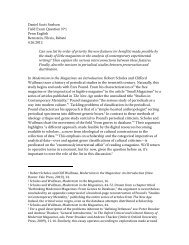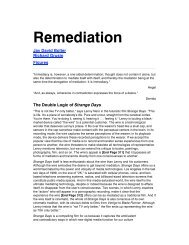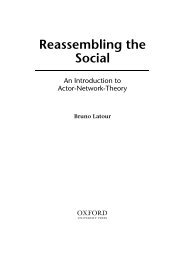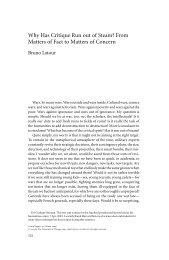The Exploit: A Theory of Networks - asounder
The Exploit: A Theory of Networks - asounder
The Exploit: A Theory of Networks - asounder
You also want an ePaper? Increase the reach of your titles
YUMPU automatically turns print PDFs into web optimized ePapers that Google loves.
Notes 173<br />
bodies, the new nondisciplinary power is applied not to man - as - body but to<br />
the living man, to man - as - living - being; ultimately, if you like, to man - as -<br />
species....After the anatomo - politics <strong>of</strong> the human body established in the<br />
course <strong>of</strong> the 18th century, we have, at the end <strong>of</strong> that century, the emergence<br />
<strong>of</strong> something that is no longer an antomo - politics <strong>of</strong> the human body,<br />
but what I would call a ‘biopolitics’ <strong>of</strong> the human race.” Michel Foucault, Society<br />
Must Be Defended: Lectures at the College de France, 1975– 76 (New York:<br />
Picador, 2003), 243.<br />
41. For more see Deborah Lupton, Medicine as Culture: Illness, Disease,<br />
and the Body in Western Culture (London: Sage, 2000); Giorgio Agamben,<br />
Homo Sacer: Sovereign Power and Bare Life (Palo Alto: Stanford University<br />
Press, 1998); Agamben’s essay “Form - <strong>of</strong> - Life,” in Radical Thought in Italy, ed.<br />
Paolo Virno and Michael Hardt (Minneapolis: University <strong>of</strong> Minnesota Press,<br />
1996); and Michael Hardt and Antonio Negri, Empire (Cambridge: Harvard<br />
University Press, 2000).<br />
42. See Foucault’s texts “<strong>The</strong> Birth <strong>of</strong> Biopolitics” and “<strong>The</strong> Politics <strong>of</strong><br />
Health in the Eighteenth Century,” both in Ethics: Subjectivity and Truth, ed.<br />
Paul Rabinow (New York: New Press, 1994).<br />
43. As Foucault notes, “After a first seizure <strong>of</strong> power over the body in an<br />
individualizing mode, we have a second seizure <strong>of</strong> power that is not individualizing,<br />
but, if you like, massifying, that is directed not at man - as - body but<br />
at man - as - species.” Foucault, Society Must Be Defended, 243.<br />
44. While theories <strong>of</strong> media and communication have preferred the term<br />
“mass audience” to “population,” in the context <strong>of</strong> the network society, we<br />
can see an increasing predilection toward the “living” aspects <strong>of</strong> networks.<br />
Quite obviously, the health care and biomedical research sectors are driven<br />
by living forms <strong>of</strong> all kinds, from “immortalized cell lines” to patients undergoing<br />
clinical trials. And despite the rhetoric <strong>of</strong> disembodied information<br />
that characterizes cyberculture, the Internet is still driven by the social and<br />
commercial interaction <strong>of</strong> human beings and “virtual subjects.” So while<br />
Foucault’s use <strong>of</strong> the term “population” is historically rooted in political economy,<br />
we suggest that it is also useful for understanding how the network diagram<br />
begins to take shape in a political way. That is because the problem <strong>of</strong><br />
political economy is also the problem <strong>of</strong> network management, or what we<br />
have called “protocological control.”<br />
45. Gilles Deleuze, “What Is a Dispositif?” in Michel Foucault Philosopher<br />
(New York: Routledge, 1992), 164 (translation and emphasis modified).<br />
46. Foucault, “Security, Territory, Population,” in Ethics: Subjectivity and<br />
Truth, 246.<br />
47. Gregor Scott, “Guide for Internet Standards Writers,” RFC 2360,<br />
BCP 22, June 1998.<br />
48. See Agamben, Homo Sacer.<br />
49. See the second chapter <strong>of</strong> Hardt and Negri, Empire.









